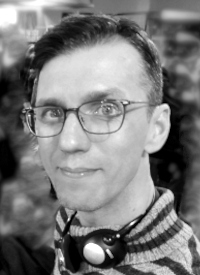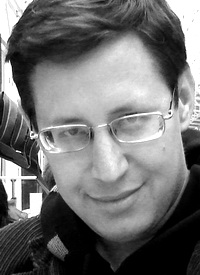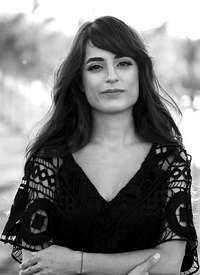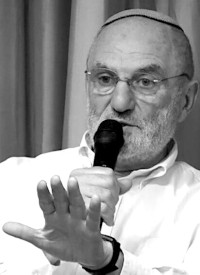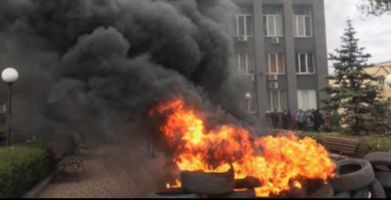
It all started with the fact that in patriotic Ternopil they refused to accept the plane with the Ukrainians who had been waiting for many weeks for evacuation from epidemic-ridden Wuhan. It was opposed in the local regional council, where right-wing and ultra-right-wing parties have been in charge for the past 30 years. The deputies officially demanded to "stop the genocide of the Ukrainian people,” and concerned Ternopil residents blocked the roads along which their fellow citizens who were in trouble were supposed to be taken.
Outraged Ternopil activists set up a checkpoint near the Medobory sanatorium, where they planned to quarantine 98 “Chinese” Ukrainians -- the real “Heavenly Hundred.” And all night in the rain they sang Psalms to the Virgin, so that she would take away the “infected” plane. Journalists arrived at the scene and recorded a video of this hysterical prayer service. And if its participants had not been holding gadgets in their hands, one would have thought that everything happened during the late Middle Ages. All that was needed was a suitable witch for public sacrifice, to be burned at the stake or lynched.
Meanwhile, in neighboring Lviv, a hospital was barricaded by tires, where, according to rumors, their compatriots were supposed to be brought -- moreover, local doctors who recited the words of the Hippocratic oath were actively involved in this action. The social networks of “Ukrainian Piedmont” were torn with indignant calls to take those who came from China to the east, and local patriotic politicians directly accused the authorities of viral sabotage against Galicians who voted for former President Petro Poroshenko in the elections.
At the same time, an urgent session of the Obukhov District Council was held, specially dedicated to the issue of the coronavirus. Deputies of this Kiev suburb categorically opposed proposals to place evacuees in the local “Prolisok” sanatorium, expressing their determination to stop the "Heavenly Hundred" while beating their chests. And all Ukraine followed the bizarre route of the plane carrying the evacuees, which circled over the Dnipropetrovsk region -- testifying to the confusion of the country's leadership, which simply did not know how to act in this situation.
After an indecently long delay, the scandalous aircraft refueled in Kiev and flew towards Kharkov. Soon it became known that they decided to place the citizens who arrived from China in the Poltava region, in the small town of Novi Sanzhary -- where street protests immediately broke out. Distraught people set fire to the same inevitable tires, blocking the medical facility, from which most of the staff immediately left. And then they clashed with the police, who brought armored personnel carriers to the scene, immediately causing observers to associate it with the events of the ATO [Anti-Terrorist Operation -- Ukraine’s war against the Donbass republics].
All this really resembled the events of six years ago -- roads blocked by an aggressive crowd, an atmosphere of psychosis and hysteria, panicky rumors, distrust and hatred of suspicious "outsiders.” This was precisely the practice of the “dignity” pogrom of Euromaidan, and today, on the next anniversary of its triumph, this boomerang has returned to different regions of the country -- demonstrating how ephemeral its advertised unity actually is.
“This story is all about our real, not pompous, patriotism. About collegiality and unity. About one country. About rotten people and about the absent state. In short, everything that we carefully hid all these years under a thick layer of provincial costumes, patriotic song and dance contests, and fences painted in yellow-blue. The state, as always, pretended for a long time that nothing was happening. It was busy with its rat-like affairs until all this swelled to gigantic proportions, convincingly proving that it does not guarantee anything, does not have control and does not know what anti-epidemic protocols are. It is always silent when there is a crisis. It does not react in any way to manifestations of murderous obscurantism. We should stop pretending that we have a capable state. And stop singing these frozen, false songs about unity, prancing on potential rogue carcasses. We no longer exist -- as a state, a community, a country. It’s just a certain geographical territory, which does not know what it wants and is ready to ruthlessly tear its own flesh. But, no -- let's spend even more Days of Unity and Days of Vyshyvanka [traditional Ukrainian embroidered shirt],” writes journalist Mikhail Podolyak.
Some justify what is happening by the growing panic around the epidemic, which since January has been diligently spread by the post-Soviet media. But fear is not an excuse for meanness, and behavior in an atmosphere of pressure and mass hysteria has always been the most accurate test of human compassion and elementary adequacy.
I know this from personal experience -- in 1986, after the Chernobyl nuclear power plant accident, my grandmother accidentally met a stranger at the Kiev railway station, who herself offered to shelter our whole family in Novyi Buh -- except for my father, who worked to clean up the consequences of the Chernobyl disaster. The attitude then towards those who fled toward Kiev was only benevolent. Simple, not very prosperous people shared everything they had, and did not pay attention to the rumors, inevitable in such situations, about the "contagiousness" of Chernobyl radiation.
Alas, these collectivist social ties were destroyed during 30 years of capitalist restoration, and the word “solidarity” suspiciously smacks of the officially banned “Soviets” for Ukrainians. Each for himself, and compatriots instantly become enemies for the patriots, against whom you can fight by any means -- including barricades on the roads. At first, they were residents of Donbass, “Soviets” and “quilted jackets,” now they are evacuees from China, and tomorrow the target of aggression could be almost everyone -- if for some reason a maddened crowd puts them in the category of strangers dangerous to them.
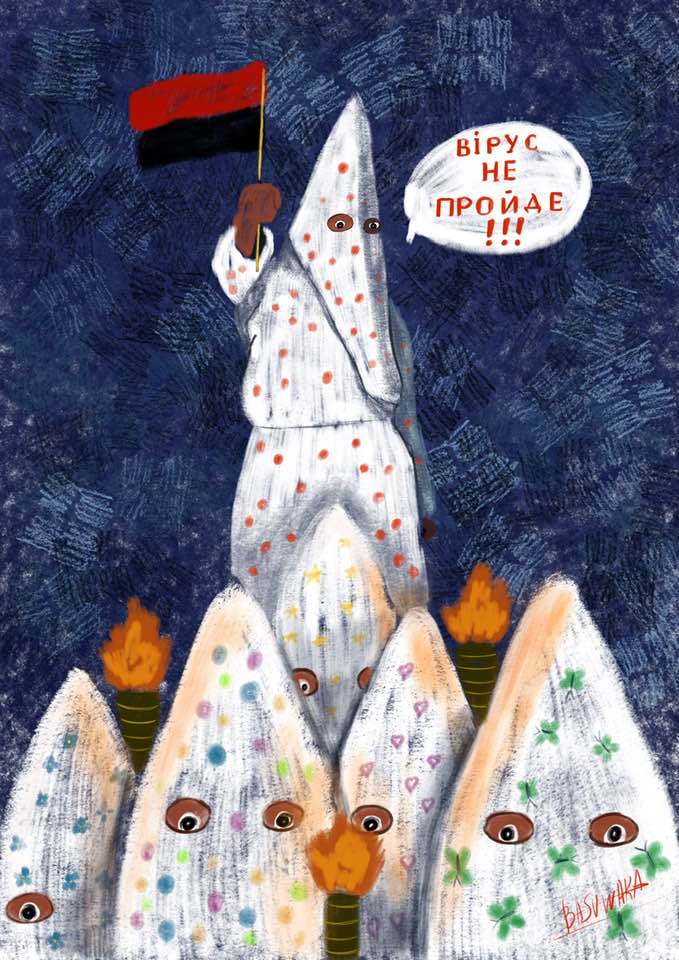
Julia Malkina, “On the path of Chinese infection”
“I think that in honor of such an important event in the history of the decommunization of our country, a monument should be erected. A huge stele. On one side is a government sending people to May Day festivities in Kiev after the Chernobyl disaster. And thousands of firefighters, doctors, and military men from all over the country traveling to Chernobyl to liquidate the consequences of the accident. On the other side of the stele, Lviv doctors, filling up the entrance to the local hospital with tires to block Ukrainians evacuated from China. And the residents of Novi Sanzhary fighting with the police for the same thing. This will be a beautiful monument, beautiful and honest, I assure you. I would even suggest a name for it: ‘Alone with ourselves,’” wrote Parliamentary Deputy Maxim Buzhansky.
It was a test for civilization, an exam for humanity -- and Ukraine failed it ahead of schedule, when, fortunately, there is still not a single person who has fallen ill in the country. At the same time, it is important to recall that one of the reasons for the panic engulfing the townsfolk was the complete helplessness of government officials, who for weeks could not bring home the citizens who were stuck in Wuhan, and did not carry out any explanatory work to bring their plans for quarantine to the public. The incompetent and opaque actions of the authorities in many respects provoked this unsightly story, which demonstrated the archaic, deep disunity and atomization of Ukrainian society. As well as chronic distrust of the ruling elite, all of whose skills boiled down to the ability to sell off the country's assets, putting them into the hands of foreign funds and oligarchs.
The word "panic" comes from the name of the goat-footed Pan -- the Hellenic deity of shepherds. They attributed to the sounds of his invisible flute the behavior of goat herds, which, sensing danger, all rushed into the fire or into the abyss. After the Battle of Marathon, when Persian warriors fled erratically from the battlefield, this word took root in the languages and literature of the ancient world, where they already knew about the social nature of panic, and knew how to use it for their own purposes. Ironically, the shepherd god himself later became a victim of this. According to Plutarch and Rabelais, a certain voice told the helmsman of a ship to announce the phrase: “The great Pan died!” -- which caused confusion in Rome and spread among the people as an omen of the end of the old pagan world.
The famous psychologist Hakob Nazaretyan points to the socio-psychological factors of mass panic, highlighting among them “the general tension in society caused by the occurrence of unexpected natural, economic, or political disasters,” as well as “the absence of a clear and highly valued common goal, or effective leaders enjoying general trust.”
“Anxiety is provoked not only by the prospect of the introduction of the ‘plague’ into the living area of the ‘clean.’ One of its causes is a total distrust of the government, and in a wider context, of the state. The hysteria is connected with the fact that no one believes in the ability of the authorities, and in the wider context of the state, to ‘ensure security.’ Let me remind you of the Gallup poll last spring: only 9% of respondents trust the state institutions in Ukraine,” the well-known historian Georgy Kasyanov rightly points out.
Everyone understands what will happen in Ukraine if the virus starts to spread on its territory -- after all, the healthcare system destroyed by the “reforms” of [U.S.-born former Health Minister Ulana] Suprun could not even cope with ordinary measles, and the half-decomposed state structures are unlikely to organize any effective fight against a dangerous disease. Right now, Ukrainians are preparing to hold a mass rally against the destruction of healthcare, the elimination of medical institutions, and the massive reduction of doctors, who receive truly miserable salaries.
During the Maidan reforms, the “Soviet” sanitary and epidemiological service was solemnly buried, and the authorities are not able to solve the most basic economic problems, such as timely repair of heating systems and bridges. It is terrible to imagine what will happen to the country in the event of a real disaster on the scale of the Chernobyl accident. Meanwhile, the gradual degradation of the state -- the collapse of the economy, production, science, culture, management structures and elementary social relations, which were replaced by the nationalist pogrom mobilizations -- constantly increases such risks for Ukraine.
In this shameful situation, I most of all feel sorry for the evacuees, who had to endure humiliation and fear in the cabin of the plane “circling” over the country. They are already on the ground, and they probably know that one of the patriotic volunteers publicly advised shooting down the plane with a missile, or sending it to Moscow. Compatriots throw stones at their buses, burn tires and put bonfires in their way, and promise to set fire to their sanatorium at night. In the place of these people, I would demand to be taken to any other country where there is basic dignity, social responsibility, humanity and security.
Unsurprisingly, Ukrainian Anastasia Zinchenko refused to fly out of Wuhan at all -- because she was forbidden to take a small dog home. The girl did not abandon her pet. And this act stands out clearly against the background of the brutality of Ukrainians, who together abandoned the people of the "Heavenly Hundred" -- who flew home on the anniversary of the Euromaidan and straight into the Middle Ages.
By Andriy Manchuk
Translated by Greg Butterfield
-
Історія
Африка и немцы - история колонизации Намибии
Илья Деревянко история колонизации Намибии>> -
Економіка
Уолл-стрит рассчитывает на прибыли от войны
Илай Клифтон Спрос растет>> -
Антифашизм
Комплекс Бандеры. Фашисты: история, функции, сети
Junge Welt Против ревизионизма>> -
Історія
«Красная скала». Камни истории и флаги войны
Андрій Манчук Создатели конфликта>>

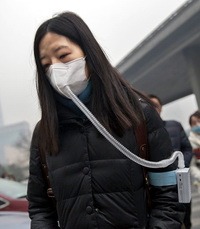
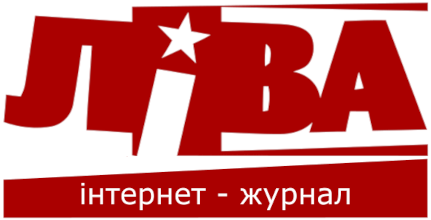










 RSS
RSS
